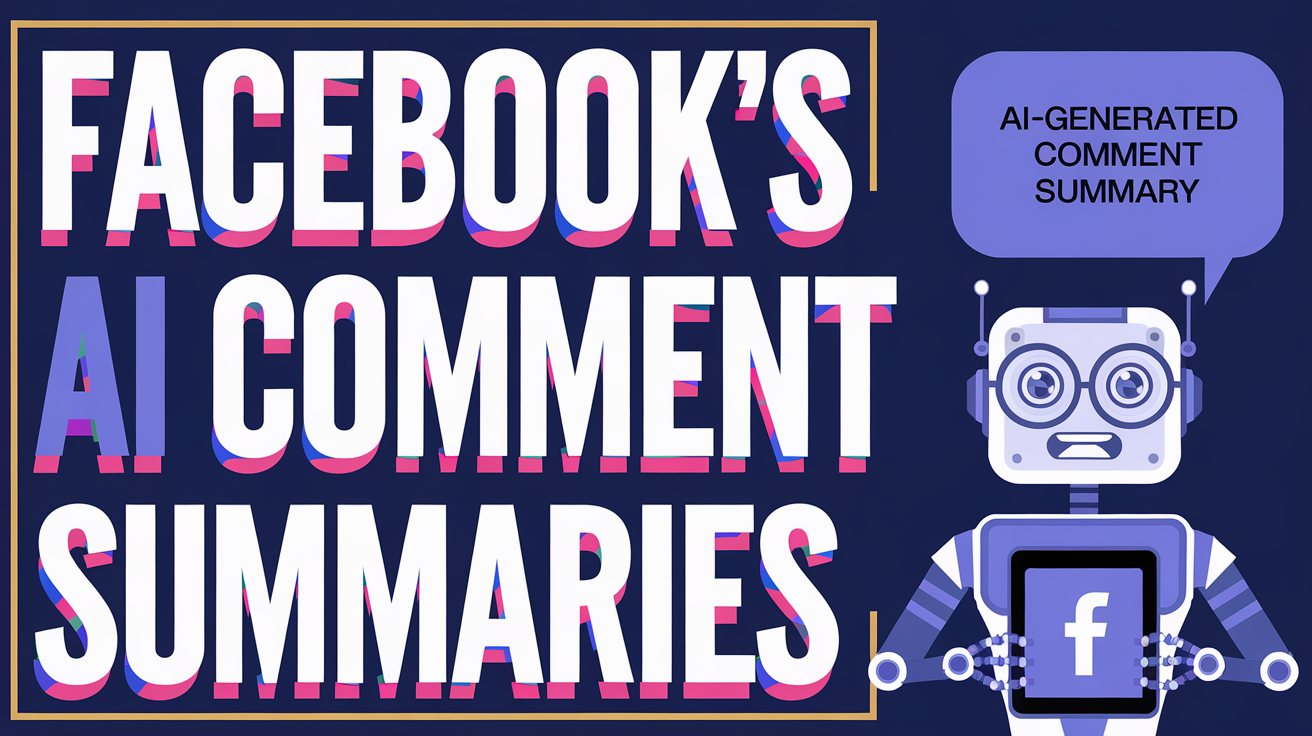Facebook has recently introduced AI comment summaries to posts. These summaries cover various topics, from store closures to Mexican street wrestling. They show how AI can understand both positive and negative feelings, even humor and criticism.
This feature might seem useful, but it’s causing privacy worries. Meta, Facebook’s owner, uses our comments to train its AI. This raises big questions about protecting our data and privacy.
In the EU and UK, Meta must tell users about this AI training. But in the US, things are different. The company says it uses our data to train AI models. We can ask for changes or deletions, but there are limits.
As Facebook integrates more AI into its platform, many wonder about the future of human connections. Could AI-generated content gradually replace authentic human interaction? This is an important question as we explore the impact of AI comment summaries and sentiment analysis. To discover more about the dynamic role of AI in social media, continue reading!
Understanding Meta’s AI Comment Summaries
Meta is introducing AI comment summaries on Facebook posts. These summaries use text classification and topic modeling to highlight what users are saying. The AI looks at comments, jokes, and opinions, making a shorter version at the top of the comments.
Facebook’s AI can understand comments in many languages. This is similar to YouTube’s AI summaries, which group discussions by topic. X also has AI summaries for trending stories, but they’re only for premium users.
While Meta’s AI summaries aim to give a quick overview, not everyone likes them. Some users find them unclear or not useful, preferring to read each comment. Facebook lets users rate how accurate these summaries are and turn them off if they want.
This AI feature is part of Meta’s plan to improve AI on its platforms. The aim is to make using Facebook better, but there are worries about losing personal touch. As Meta keeps working on this tech, it’ll be interesting to see how it changes social media.

The Evolution of Facebook AI Comments
Facebook’s use of AI has evolved from basic moderation to more sophisticated techniques like entity extraction and text summarization. This development enables a better understanding of user comments, allowing AI to grasp context and sentiment. As a result, AI-generated summaries are changing how we interact with content on the platform.
Mark Zuckerberg envisions a future where AI plays a larger role on Facebook, possibly even creating a significant portion of content. However, the prospect of a platform dominated by AI-generated posts raises questions about user preference and engagement. Facebook must strike a balance between leveraging AI advancements and preserving the personal touch that draws users to the platform.
In the broader tech landscape, people have mixed reactions to AI in social media. A study analyzing 34,000 Reddit comments revealed both positive and negative opinions. As AI continues to improve, addressing these ethical and societal concerns will be critical to maintaining user trust.
Facebook AI Comments: Impact on User Experience
Facebook’s AI comment summaries have changed how users interact with content, making engagement quicker and more efficient. However, this convenience raises questions about the impact on deeper, more meaningful conversations. Below are some key impacts of this feature on user experience.
- Increased Efficiency: AI comment summaries offer a quick overview of discussions, saving users from scrolling through long comment sections.
- Improved Content Filtering: The AI can identify toxic or negative content that users might miss, enhancing the quality of interactions.
- Shallow Understanding: While AI captures the general mood of discussions, it may miss nuances in complex debates, offering a trade-off between speed and depth.
- Shift in User Engagement: Users are more likely to engage with posts after reviewing comment summaries, influencing which conversations they join.
- Enhanced Interaction with Brands: With over 60 million business Pages, AI comment summaries could significantly impact how users interact with brands on Facebook.
- AI’s Expanding Role: Beyond comment summaries, AI is assisting with features like birthday greetings, dating profiles, and suggested replies for creators, influencing broader user interactions.
- Potential Impact on Human Interaction: While AI enhances efficiency, there are concerns about how it might affect authentic, human-driven conversations in the long run.
Privacy Implications of AI-Powered Comment Analysis
Meta’s use of AI to analyze and summarize user comments is causing privacy concerns. In the US, Meta’s privacy policy allows the company to use data from posts, photos, and comments to train AI models. As a result, users have limited control over their data. Unlike in the EU and UK, US users cannot opt out of having their content used for AI training, sparking debate over data ownership and privacy rights.
This practice has significant implications, especially as more companies adopt AI technologies. Meta’s approach highlights the need for users to have more transparency and control over their data. This concern has persisted since the 2018 Facebook-Cambridge Analytica scandal. As AI continues to grow within Meta’s ecosystem, ensuring data protection will be crucial.
Meta’s AI Training Practices in Different Regions
Meta’s approach to AI training varies by region due to differing laws. In the EU and UK, strict regulations require Meta to notify users and offer them the option to opt out of AI data training. In contrast, US users do not have this choice, reflecting the varying degrees of privacy protection around the world.
Starting June 26, 2024, users in the EU and UK can refuse to have their data used for AI training, underscoring the impact of regional laws on AI development. In the US, where privacy laws are less stringent, users must take steps like adjusting “activity off Meta” settings or making their accounts private to mitigate data use. This regional disparity highlights the complexities of balancing AI innovation with privacy protections.
The Controversy Surrounding Meta’s Privacy Policy Update
Meta’s recent privacy policy update has caused a lot of debate. It will affect users on Facebook, Instagram, and Threads starting June 26, 2024. Many are worried about their privacy rights.
Meta says the update makes things clearer and gives users more control. But, privacy groups disagree. They’re upset that Meta can use posts, images, and comments for AI training. This includes analyzing how users feel about things.
In response, privacy advocacy groups like Noyb have filed complaints across Europe, challenging Meta’s compliance with the General Data Protection Regulation (GDPR). The controversy underscores the tension between advancing AI technology and protecting user privacy.
Opting Out: Challenges and Limitations
Trying to opt out of data collection by Meta is tough. Users struggle to control how Meta uses their information for text classification and AI training. In the EU and UK, people submit objection forms, but Meta doesn’t always accept them. This makes people question their control over their personal data.
In the US, it’s even harder. Meta doesn’t let users easily opt out of AI training. Users can only delete their personal info from chats with Meta AI. This shows the need for better data rights and user control.
To opt-out, users must go to the Help Center, look for privacy options, and send a request. After confirming with an OTP, they get a message saying Meta will look into it. This slow process leaves many feeling upset and powerless over their data rights.
Artists worry deeply about Meta using their work in AI training without permission. Some have stopped using the platform to protect their art. This shows the growing conflict between user rights and Meta’s data use.

Comparing Meta’s Approach to Other Tech Giants
Meta isn’t the only one using user data for AI training. Many big tech companies are racing to make their AI models better. Meta says it’s more open and user-friendly than its competitors. This made me think about how the industry uses data for AI training.
Meta’s AI language models are huge, with billions of parameters. They’re even working on a model with around 400 billion parameters. This shows how much data they use to train their AI. Companies like Google and OpenAI are also working on big models, making the competition fierce.
Language detection is a key feature in these AI models. They help with chatbots, writing reports, and summarizing documents. Meta has put its AI assistant on Facebook, Instagram, WhatsApp, and Messenger. This aims to improve user interactions on these platforms.
Meta stands out because it’s open-source. They made parts of their AI systems public for others to use. This is unlike Google and OpenAI, which keep their systems closed. Meta’s Llama 3 model is a big step in open-source technology.
The tech giants have different views on market influence, accessibility, and societal impact. As these AI technologies grow, they’ll change how we use social media and other industries.
The Future of AI in Social Media Interactions
AI is revolutionizing social media, enabling platforms to process vast amounts of data and create personalized content for users. Experts project rapid growth for social media marketing, with AI playing a central role in crafting tailored experiences and advertisements.
Beyond marketing, AI helps moderate content, making platforms safer by identifying and removing harmful content. As AI continues to improve, it will enhance everything from user interactions to platform safety.
User Rights and Data Ownership in the Age of AI
As AI grows, our views on data rights are changing. Tools like text summarization are reshaping how we see content. But, the question of who owns our online creations is key in the AI ethics debate.
Getty Images sued Stability AI for using millions of photos without permission. This case highlights how fast AI is advancing versus our laws. In fact, 84% of legal issues surrounding AI-generated content remain unresolved. It’s like the wild west out there!
Artists share these concerns as well as AI art could threaten their jobs. But it’s not just about art. AI needs a lot of data to learn, often from the entire internet. This raises questions about fair use and copyright. As AI continues to grow, we’ll need new rules to protect our rights and ensure fairness in this digital age.
AI Innovation vs. Privacy: Discover the Balance With Social Meep
Facebook’s AI comment summaries are an interesting development, giving us a quick way to catch up on conversations. But they also bring up real concerns about privacy. Meta’s use of our personal data for AI training, especially with differences in privacy protections across regions, leaves many of us wondering just how much control we really have.
As AI becomes a bigger part of our social media experience, the challenge will be finding a balance between cool new features and protecting our privacy. At the end of the day, it’s about making sure we don’t lose the human touch in our online interactions.
Facebook’s AI comment summaries offer just a glimpse into what the future of social media might look like — but are you ready for it? As AI continues to evolve, it’s reshaping the way we interact, engage, and build relationships online.
At Social Meep, you can dive deep into how AI and other innovative tools are transforming social media practices. This includes everything from content creation to user engagement strategies. Don’t get left behind! Keep exploring to stay ahead of the trends and learn how you can adapt and thrive in this fast-changing digital landscape.
